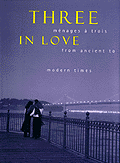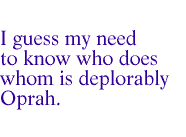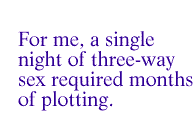|
 |

|

|
Three in Love: Ménages à Trois from Ancient Times to the Present by Barbara Foster, Michael Foster and Letha Hadady(HarperSanFrancisco, 1997; 450 pages.) |
|

|
Lest we be inclined to let Marv Albert give the threesome a bad name, Three in Love: Ménages à Trois from Ancient Times to the Present, by Barbara Foster, Michael Foster and Letha Hadady, has arrived in time to defend this age-old indulgence. The authors seem to view ménage participants as members of a misunderstood minority  group whose contributions to civilization have too long been overlooked. Not to be outdone by gay historians, who can argue that geniuses from Socrates to Santayana have been homosexual, Three in Love outs nearly every significant Western political, literary or artistic figure as a "ménager" -- from Catherine the Great to Allen Ginsberg. group whose contributions to civilization have too long been overlooked. Not to be outdone by gay historians, who can argue that geniuses from Socrates to Santayana have been homosexual, Three in Love outs nearly every significant Western political, literary or artistic figure as a "ménager" -- from Catherine the Great to Allen Ginsberg.
The authors, themselves a threesome, labor tirelessly to demonstrate the productivity of ménages, showcasing numerous examples of greats who did their best work ensconced in a fleshy triad. Voltaire and his mistress, the marquise de Châtelet, were both at their intellectual peak, concocting groundbreaking political and scientific theory, while living -- and dining regularly -- with her husband, the cheerfully accommodating marquis. Eleanor Roosevelt essentially became co-president after FDR's mistress, Missy LeHand, assumed many of her wifely duties. This is just the beginning: ménagers, apparently, deserve credit for Genesis, courtly love, Napoleon's defeat, Romantic poetry, the birth of communism, existentialism, surrealism and the Beats -- not to mention the inception of the Beatles. Caught up in their revisionist enthusiasms, Foster et al blithely overlook the ménage's shortcomings. Their discussion of novelist Radclyffe Hall, for instance, makes no mention of the sad endings of her threesomes -- one lover's probable death from a broken heart, and another's dissatisfied departure.
Though generous with details about history's swingers, movers and shakers, Three in Love's authors are conspicuously coy when it comes to their own situation. Hunter college professor Barbara Foster, her husband Michael Foster and their "third," Letha Hadady, repeatedly refer to the work as a collaborative effort, but the careful reader will note that Hadady's name appears in markedly smaller letters on the cover. The Fosters are described as "a husband and wife writing team" while Hadady is "part of their household." Did she really help, or is her byline just a public relations stunt? Maybe it's ménagephobic of me to be suspicious.
But that's only the first mystery. We are treated to sparing descriptions of hot tub loungings, hotel check-ins, and so on, but we  never learn who does whom. In fact, they are indignant that people are so carnally-minded as to be curious. Can you imagine, they complain: "even casual acquaintances may pose intimate and embarrassing questions, such as who pays the bills and who sleeps with whom." I guess my need to know all that is deplorably Oprah. But the ménage à trois is such a compelling fantasy, and the logistics of the real thing so baffling that people who claim to be engaged in a successful one shouldn't be surprised if the rest of us are interested in the fine points. never learn who does whom. In fact, they are indignant that people are so carnally-minded as to be curious. Can you imagine, they complain: "even casual acquaintances may pose intimate and embarrassing questions, such as who pays the bills and who sleeps with whom." I guess my need to know all that is deplorably Oprah. But the ménage à trois is such a compelling fantasy, and the logistics of the real thing so baffling that people who claim to be engaged in a successful one shouldn't be surprised if the rest of us are interested in the fine points.
Indeed, part of the ménage's draw is that most of us have been involved in an unlucky love triangle at some point. Usually everyone loses, and in retrospect it often seems that a happier outcome must have been possible. As Foster et al imply, the ménage à trois is the love triangle's benevolent twin. In a ménage, everyone consents, cooperates and ideally, prospers (rarely equally, of course, but that's also true in traditional couplings). Most couples have an intruder (real or imagined) lurking around wreaking havoc, threatening the happy twosome; the ménage domesticates -- and eroticizes -- that scary third.
A ménage can also offer a way out of the elusive, historically recent ideal of being best friends with your lover; why not instead share a lover with your best friend, as Butch Cassidy and the Sundance Kid did with Etta Place, or Beat buddies Jack Kerouac and Neal Cassady with Carolyn Cassady? Most ménages -- unless all three participants are the same sex -- hint at bisexuality. Foster et al downplay this, but I think it's a central part of the ménage's mystique, regardless of the reality of who does whom. For many of us, the ideal lover is both male and female, but we tend to assume that we have to choose. Simone de Beauvoir thought otherwise, writing near the end of her life on her ménage with Sylvie Le Bon and Sartre, "I am fortunate to enjoy a perfect relationship with both a man and a woman."
My own dabblings in ménage have been less evolved: a single night of three-way sex between my then-boyfriend, my roommate and me required months of plotting. Yet as absurd as it sounds, I hadn't actually considered how I would feel about seeing my lover with another woman. As  he buried his face in her pubic hair, blonder, trimmer than mine, I wondered if he was taking note of our differences. I tried, in a desperate panic, to imagine what they'd do if I suddenly got dressed and left the apartment. Or asked them to stop. But these impulses seemed melodramatic and churlish, since I had very much enjoyed eating her myself just minutes before. My mind raced beyond the bed: she's prettier, sweeter, less neurotic than me. They both like Nick Drake. They dress similarly. I couldn't imagine why he'd ever stay with me after this. he buried his face in her pubic hair, blonder, trimmer than mine, I wondered if he was taking note of our differences. I tried, in a desperate panic, to imagine what they'd do if I suddenly got dressed and left the apartment. Or asked them to stop. But these impulses seemed melodramatic and churlish, since I had very much enjoyed eating her myself just minutes before. My mind raced beyond the bed: she's prettier, sweeter, less neurotic than me. They both like Nick Drake. They dress similarly. I couldn't imagine why he'd ever stay with me after this.
The next day, we all talked about it. My roommate wanted to repeat the threesome. But my boyfriend and I, both a bit shell-shocked, were hesitant. She left the country a few weeks later, before we could reconsider.
Given the questions raised by even the most fleeting ménage, it seems that people who manage to figure out larger matters like who takes whose name really ought to disclose a little more. How does one avoid favoritism? I can't forget my mental flight on the bed and its myriad attendant nightmares. What if they'd wanted to spend some night without me? He'd said that I could have sex with her alone as long he got a detailed description; I'm not sure I would have agreed to reverse these terms. What if they were only doing this to get to each other, and I was really an obstacle? The scary scenarios are stomach-clenching, yet so plainly plausible.
It's easy to see why ménages aren't more common; they present a daunting thicket of emotional and practical challenges. Three in Love, though its historical anecdotes are delightful, is too evasive to blaze much of a trail. Let's hope it inspires more revealing work. |
Read Foster, Foster and Hadady's retort to Liza Featherstone.
For more Liza Featherstone, read:
Going with the Flow
Shocking Fuzz
Paradise Lost: Living in Latex
Let's Talk About Saving $8.50
The Art of Noise
Seduced by Casanova: The Psychoanalyst on the Lover
Circling the Threesome
©1997 Liza Featherstone and hooksexup.com
|
 |
|